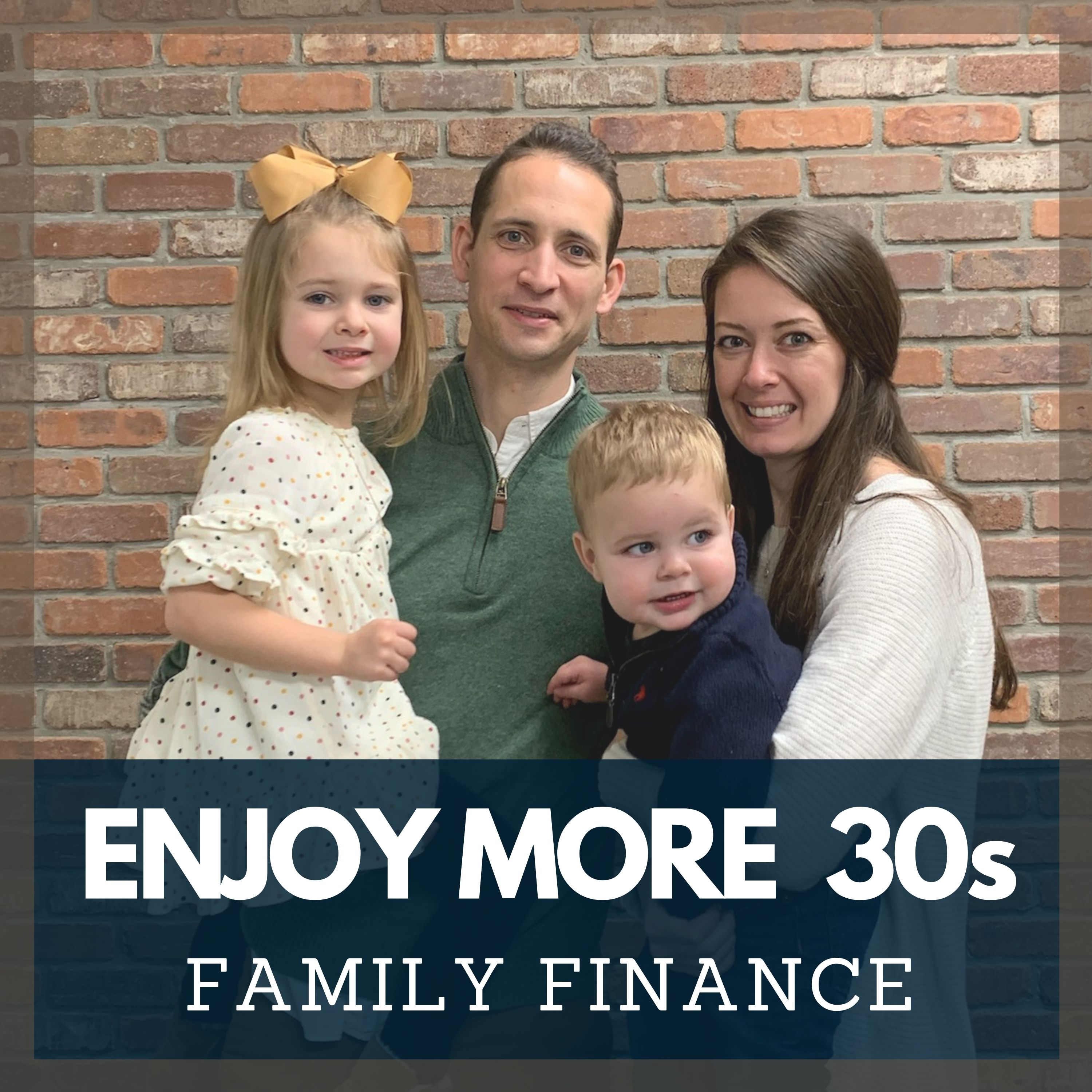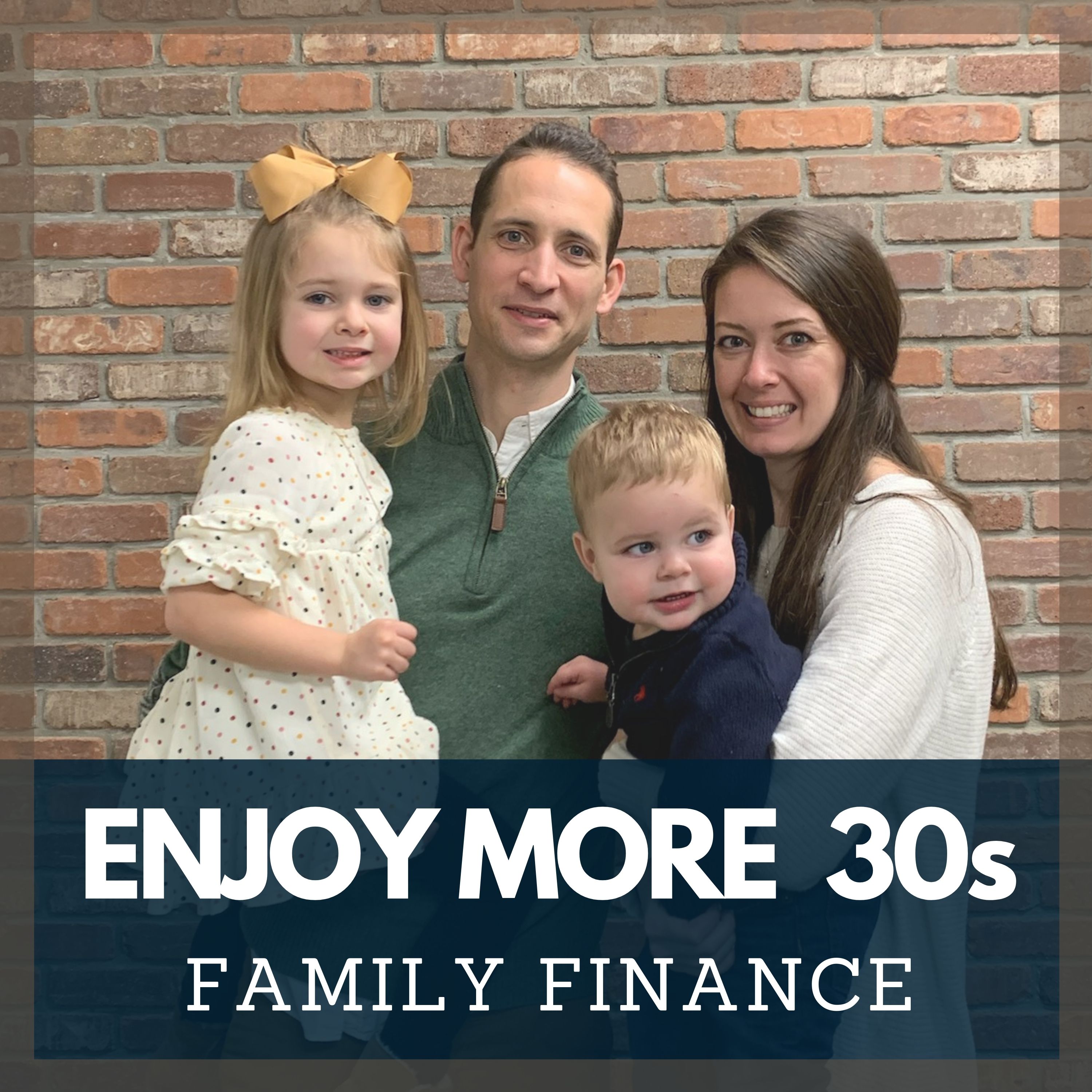Episode 3
Survivors Don't Care About Too Much Life Insurance | Series 1.3
Young Families Are Often Underinsured, Are You?
- Future income potential (01:27)
- Having conversations: know what you're solving for (03:55)
- Living worry-free (05:57)
Quote for the episode: "If your family basically has too much life insurance from you- not a problem. If your family does not have enough life insurance- very, very large problem."
Securities offered through TFS Securities, Inc., Advisory Services through TFS Advisory Services, a SEC Registered Investment Advisor Member FINRA / SIPC. TFS Securities, Inc. located at 437 Newman Springs Road, Lincroft, NJ 07738 (732) 758-9300.
Transcript
Welcome to the Enjoy More 30s: Family Finance
Voiceover Audio:podcast, the only podcast dedicated to making life more
Voiceover Audio:enjoyable for young families by hitting on the financial topics
Voiceover Audio:that tend to weigh on us, stress us out and distract our focus
Voiceover Audio:from simply enjoying life.
Joseph Okaly:Hello, and welcome to the Enjoy More 30s: Family
Joseph Okaly:Finance podcast. Today is the third episode in the "Your Money
Joseph Okaly:Mindset" initial series and it's titled "Survivors Don't Complain
Joseph Okaly:About Too Much Life Insurance". So in this episode, we're going
Joseph Okaly:to cover what you need to know about having enough life
Joseph Okaly:insurance to protect your family, and what you can do to
Joseph Okaly:actually achieve it. We've all been to the movie theater
Joseph Okaly:before, I know everybody out there has been to at least one.
Joseph Okaly:And when you go to buy your popcorn, you almost have to buy
Joseph Okaly:that giant, enormous bucket that you can refill a million times.
Joseph Okaly:You know that after you finish eating all of it, you're going
Joseph Okaly:to feel sick and nauseous and terrible, but at the end of the
Joseph Okaly:day, you can save like $1. If you get the smaller one, you get
Joseph Okaly:a bag that's 50% smaller and no refills, so why not pay a little
Joseph Okaly:extra and get so much more.
Joseph Okaly:So what you need to know is that life insurance, when you're
Joseph Okaly:young and healthy, is much the same way- a little bit more can
Joseph Okaly:really, really go a long way. This tends to be ironic because
Joseph Okaly:the vast majority of young families we come in contact with
Joseph Okaly:are exceedingly underinsured. The reason is most families are
Joseph Okaly:not aware of what their biggest asset by far is. And that's your
Joseph Okaly:future income potential- you have the next 20-30 years or
Joseph Okaly:maybe more, depending on when you're listening, of income and
Joseph Okaly:all the raises that come with it as you progress through your
Joseph Okaly:career. Let's say that you're making $100,000 right now. Over
Joseph Okaly:just the next 20 years, assuming no raises ever during that whole
Joseph Okaly:period, you already have $2 million in future income
Joseph Okaly:potential coming to you. Now, if you add on raises, if you add on
Joseph Okaly:10 more years, it could be $3-$4 million or even more. Now, I'm
Joseph Okaly:young, and I obviously don't plan on dying anytime soon, God
Joseph Okaly:willing. So it's an easy thing to simply ignore, despite it
Joseph Okaly:being our biggest asset. Who really wants to think about
Joseph Okaly:dying, right? The problem is that because we have families, a
Joseph Okaly:lack of insurance could be catastrophic, and I'm not
Joseph Okaly:overestimating that. I don't want my wife to have to sell our
Joseph Okaly:home. I don't want her to have to work more and see her kids
Joseph Okaly:less, in a scenario where I'm not here, when they probably
Joseph Okaly:need her the most. I still want her to be able to send our kids
Joseph Okaly:to college, still want her to retire, still hit all the goals
Joseph Okaly:we have together, even if I'm not here.
Joseph Okaly:And that brings us to the title of the episode, "Survivors Don't
Joseph Okaly:Complain About Too Much Life Insurance". If they don't have
Joseph Okaly:enough, though, that's a whole different story. So the
Joseph Okaly:difference between, say a $1.5 to a $2 million dollar policy
Joseph Okaly:for a preferred plus- so top-health kind of individual
Joseph Okaly:for 30 years, that's a 30 year old person- might be an
Joseph Okaly:additional $25-$50 a month to go from that $1.5 million to the $2
Joseph Okaly:million policy. Depends on the carrier, the situation, what
Joseph Okaly:state you live in, but as a rough estimate, if you're in
Joseph Okaly:really good health as a 30 year old, it could be somewhere in
Joseph Okaly:that $25 to $50 a month additional range to get that
Joseph Okaly:extra $500,000 of coverage. Now I'm willing to bet you're not
Joseph Okaly:going to notice an extra $25 a month. If I look at your credit
Joseph Okaly:card statement, I'm sure it varies month by month more than
Joseph Okaly:$25. But I guarantee you your family's going to notice an
Joseph Okaly:extra $500,000 if you're no longer here. If your family
Joseph Okaly:basically has too much life insurance from you- not a
Joseph Okaly:problem. If your family does not have enough life insurance-
Joseph Okaly:very, very large problem. So what can you do?
Joseph Okaly:The first step, like for a lot of these, is having a
Joseph Okaly:conversation with your spouse. What would you want to have
Joseph Okaly:happen if either of you passed? Stay in your home, move closer
Joseph Okaly:to other relatives? First you need to really know what you're
Joseph Okaly:solving for. You have some people that say, "Hey, I want to
Joseph Okaly:move in with my parents if that were to happen." Great. Now we
Joseph Okaly:know the situation that we're solving for and we want to make
Joseph Okaly:sure that we're protected against enough for that. For the
Joseph Okaly:primary caregiver, this should also include childcare. A
Joseph Okaly:caregiver spouse may not earn any salary, but they are saving
Joseph Okaly:$20 to $25,000 a year. I mean, if you're in New Jersey, you're
Joseph Okaly:certainly saving $25,000 a year, which should be accounted for.
Joseph Okaly:So for example, $25,000 a year for 18 years- say someone just
Joseph Okaly:had a child today- that comes out to around $450,000 to cover
Joseph Okaly:the entirety of that person's childcare if something, God
Joseph Okaly:forbid, were to happen to the caregiver spouse today. So a 20
Joseph Okaly:year term policy, $450,000, that could easily cover the caregiver
Joseph Okaly:spouse.
Joseph Okaly:For an income earning spouse, you may need to take a look at
Joseph Okaly:what you're actually living on. Life Insurance comes to tax
Joseph Okaly:free; that's one of the great things about life insurance. So
Joseph Okaly:if you're living right now for your expenses- so you added up
Joseph Okaly:all your gas, mortgage, all that- and came out to $5,000 a
Joseph Okaly:month. And then you looked at what you're saving, and that's
Joseph Okaly:$1,000 a month, let's say. First step is pretty easy. I'm living
Joseph Okaly:on five, I'm saving one, five plus one equals six. So pretty
Joseph Okaly:easy so far. So you need roughly $6,000 a month to replicate. If
Joseph Okaly:both spouses are working, you can back out their net income
Joseph Okaly:from that equation, but with no other income to consider, this
Joseph Okaly:family in this example, is needing around $72,000 a year.
Joseph Okaly:So over 20 years, this might be around one and a half million
Joseph Okaly:dollars of coverage. This type of policy generally should take
Joseph Okaly:you out to retirement. So if you're 30 years old, or 30 years
Joseph Okaly:out, then a 30 year term provides you with the majority
Joseph Okaly:of your insurance you'd likely need, and you're done with
Joseph Okaly:having to have this weigh on your mind. I have the
Joseph Okaly:conversations already in the past with my wife, where we went
Joseph Okaly:over the scenarios, we obtained the coverage that we needed to
Joseph Okaly:protect against those scenarios, and now I don't have to worry
Joseph Okaly:about it anymore. I never worry about "if something were to
Joseph Okaly:happen to me, would my family be taken care of financially? Or if
Joseph Okaly:something happened to my wife, would I be able to afford the
Joseph Okaly:childcare that I would need and want from my kids?" I don't have
Joseph Okaly:to worry about that. And it's a question that you don't have to
Joseph Okaly:worry about either, if you follow through with these steps.
Joseph Okaly:The last part of this whole situation that is also important
Joseph Okaly:to take into account is unless you plan on never leaving your
Joseph Okaly:employer, and your employer can essentially not fire you ever-
Joseph Okaly:think kind of like a tenure teacher kind of thing- you
Joseph Okaly:should likely not rely on your work insurance as part of your
Joseph Okaly:total. Work insurance may not be something that you can take with
Joseph Okaly:you many times, or if you can, you need to generally convert it
Joseph Okaly:into what would be a very expensive permanent type policy
Joseph Okaly:in most scenarios. So basically, if you rely on work insurance,
Joseph Okaly:and then you have to leave your firm, and your health is no
Joseph Okaly:longer good, you can find yourself in a bad situation.
Because your choices will be:no insurance- not a good choice. Or
Because your choices will be:converting the work insurance policy to a permanent type of
Because your choices will be:insurance- which would be extremely expensive, and who
Because your choices will be:knows if you'd be able to afford that or not, or even if the
Because your choices will be:coverage amount would be what you wanted it to be or needed to
Because your choices will be:be. Essentially it would be outside of your control. If you
Because your choices will be:get life insurance on your own, that policy is within your
Because your choices will be:control forever, as long as you pay your premiums, doesn't
Because your choices will be:matter what your employment is or anything else.
Because your choices will be:As a young family, you want to just basically buy the bigger
Because your choices will be:popcorn bucket when it comes to life insurance. The great part
Because your choices will be:is once it's done, you have the majority of your income needs
Because your choices will be:locked in now long term. And that 'what if' question again
Because your choices will be:about your family is covered. Now if you start making a lot
Because your choices will be:more, your expenses come up, you can always add on that
Because your choices will be:additional policy if you need to, or even build in a little
Because your choices will be:bit of a buffer now. But the majority of your insurance needs
Because your choices will be:should be handled and covered after this. There should be no
Because your choices will be:vast underinsured person after going through this exercise if
Because your choices will be:it's done properly.
Because your choices will be:So main points to remember after today's episode. First thing,
Because your choices will be:just buy that bigger popcorn bucket- look at it that way-
Because your choices will be:it's a little bit more, it's not going to really affect your
Because your choices will be:lifestyle and you get a lot of bang for your buck, especially
Because your choices will be:when you're young and healthy. Second thing is having that
Because your choices will be:conversation. What are you trying to cover for, what are
Because your choices will be:you trying to protect for, and make sure that everything is
Because your choices will be:lining up for what you're trying to accomplish between you and
Because your choices will be:your spouse. Thanks very much for tuning in today. As always,
Because your choices will be:if you enjoyed this episode, please make sure to review us on
Because your choices will be:Apple podcasts or wherever you listen. There are literally
Because your choices will be:millions of young American families out there I'm trying to
Because your choices will be:reach and help just like you. Check back in soon for our next
Because your choices will be:episode, "You May Already Be a Future Millionaire". Thanks very
Because your choices will be:much as always, and I'll talk to you again soon.
Voiceover Audio:The conversations on this show are
Voiceover Audio:Joe's opinions and provided for general information purposes
Voiceover Audio:only. They do not constitute accounting, legal tax or other
Voiceover Audio:professional advice for your specific situation. You should
Voiceover Audio:always seek appropriate advice from a financial advisor,
Voiceover Audio:accountant, lawyer or other professional before acting upon
Voiceover Audio:any content or information found here first. Joe is affiliated
Voiceover Audio:with New Horizons Wealth Management LLC, a branch office
Voiceover Audio:of TFS securities Inc and TFS advisory services and SEC
Voiceover Audio:registered investment advisor member FINRA/SIPC.


